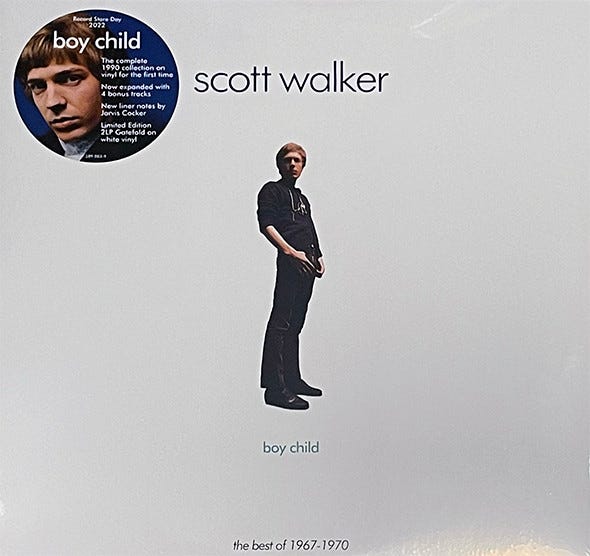There are pop singers, and then there is Scott Walker. Here is an artist that wandered through the landscape of the pop music world yet, marched to his liking as he participated in the mechanics of music stardom in England 1960s. From the Mod world to the Hippies, Scott wouldn’t have any of that. He was a creature who was spiritually from the Existential 1950s, a self-made obsessive on European cinema and literature. Although as a pop singer, he spoke English to the press and that world. Walker was very much minded in another part of the psyche that approached new sensations through vocabulary. Language had nuances and sensibility. The very image of Scott Walker is so different from the others of that era. While fellow musicians vocally marveled at the talents and genius of Jimi Hendrix, The Beatles, and others, Walker was into Jazz, Jack Jones, and Jean-Paul Sartre. Here was a teen idol who didn’t play by the rules of stardom. He was a journeyman of that period, but his thinking and aesthetics were far from the local London scene. His heart and brain seemed to be placed in Saint Germain des Prés on the Left Bank of Paris.
I knew of The Walker Brothers and their history and heard the hits, but that was it. The compilation album that came out in 1990, Boy Child, was my first real introduction to the music of Scott Walker. I went back to the 1984 release of Climate of Hunter and then purchased a best of The Walker Brothers compilation. But Boy Child is a collection of solo Scott recordings from 1967 to 1970. He tore up the rule books of pop music procedure in those years and invented an English-speaking version of the French chanson. Scott’s brain and heart got ripped apart when he heard the recordings of Jacques Brel at a girlfriend’s house. She introduced him to this artist, and Scott obsessed over his music, image, and French/Belgian culture. While others in his field were admiring Howlin’ Wolf, The Everly Brothers, Walker was enticed by the talents of writers such as Albert Camus, Jean Genet and the more experimental literature that was produced in those years. He made his bowl of soup with those ingredients, which became his solo recordings of that late decade.
Boy Child is a remarkable compilation because of its intelligence and taste. I believe Martin Callomon (sometimes known as “Cally”) put together this remarkably focused package. The reissue is a Record Store Day release with the original liner notes by Marc Almond, and the new edition has essays by Jarvis Cocker and Neil Hannon. As a solo artist, Scott covered other songwriters, such as Michel Legrand (can’t go wrong with a Legrand tune), Tim Hardin, Andrè Previn, Henry Mancini, and Jacques Brel. Boy Child, and rightfully so, only focuses on Scott’s songwriting, except for The Rope and Colt, written by Harold David. The influence of Brel is acute concerning the intensity of Scott’s narrative and his choice of words to express the story. When he recorded and wrote these songs, he was a storyteller and a master of that medium.
The pleasure of Scott Walker’s career is listening and watching him move from one form of song style to the next. He rarely looked back for a specific styling but used his past to build on to continue his musical explorations. Boy Child successfully bookmarks a specific era of his work, but also he was a conceptualist who spent time thinking out chapters in his life. He was like a novelist mapping one’s book in chapter form. Once he finished that segment or section of the book, he moved on. So, we don’t have the whole story, but we do have a complete narrative, and this is what Boy Child is, a remarkable work of an artist making exceptional music. He, in the future, continued to create pieces that border on the avant-garde and modern, showing what vision he had and consistently worked for. Personally, whenever I do anything creative, I think of Scott Walker as a symbol of someone who keeps growing and taking chances. I hope the same for me.




Allison, that is a tough decision to make. Be careful! On the other hand you can give it to your daughter as a gift, and then borrow it later. That can be a win-win situation!
I just bought this in Austin at Waterloo and debating whether to give it to my daughter or keep it. As a result I haven't played it yet. But after reading this...will I be the great mother and give it to her or be incredibly selfish and keep it for myself?? Hmmm! Ha...yeah...maybe she bought it for me for Mother's Day! We are both enormous fans and I once wrote a script around an entire soundtrack of Scott Walker songs. He was unto himself. Lucky us!